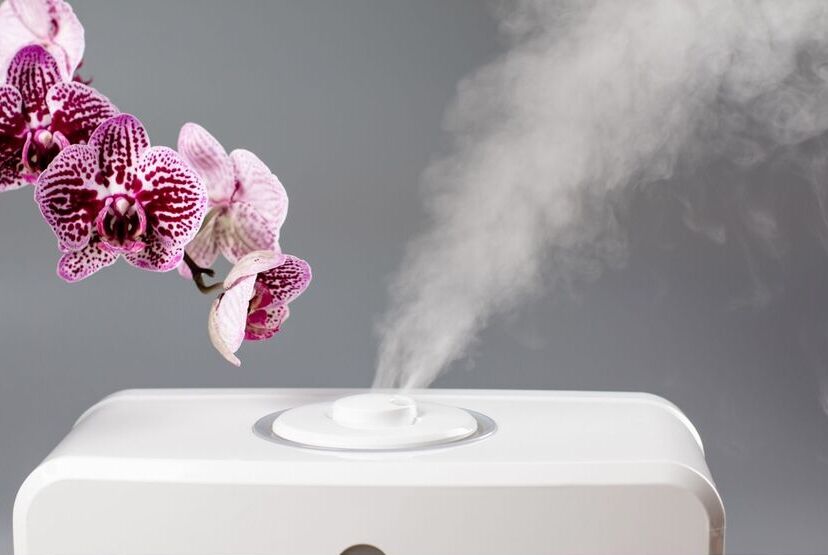Humidifier vs. Air Purifier
What’s the difference between a humidifier and an air purifier?
The answer should be pretty obvious you would think.
And on the surface it is.
An air purifier purifies the air and an air humidifier adds humidity to the air.
And when you’re trying to decide whether you need to run an air purifier or to run a humidifier,
The answer to that should seem pretty obvious too.
Do you want to filter the air or do you want to add moisture to the air?
But here is where it gets a little more interesting.
Dry air and humidity have a direct link to the transmission of viruses and allergies in the air.
Two things that you would normally consider to fall in the air purifier category.
According to an article in science daily, professor Michael Ward states “when the humidity is lower, the air is dryer and it makes the aerosol smaller”
He also added, “the aerosols are smaller than droplets. When you sneeze and cough those smaller infectious aerosols can stay suspended in the air for longer.
That increases the exposure for other people. When the air is humid and the aerosols are larger and heavier they fall and hit surfaces quicker.”
Cooler air can cause the humidity to drop as much as 20%. Which makes it much easier for airborne particles to travel.
Secondly, the extra dry air can cause the body’s own natural humidifying and air purification functions, called Cilia, not to function optimally and have a harder time expelling viral particulates as well as it would in normal humidity.
An experiment cited by medicalnewstoday.com shows that rodents placed in an environment with 10% relative humidity “succumbed to influenza virus infection more rapidly than those housed in 50% relative humidity.”
The study also showed that dry air caused the immune response in the mice to be less efficient.
So what does it mean?
The capacity of a humidifier to be able to reduce the spread of viral particles seems to have an edge in the cold dry months compared to an air purifier.
But don’t throw the baby out with the bathwater.
A good air purifier, especially one that uses an h13 HEPA filter, can reduce the number of allergens and viruses in the air significantly. Regardless of the relative humidity.
Other types of air purifiers that use plasma wave or bipolar technologies can also significantly lower the amount of virus particulates in the air.
Furthermore, air purifiers are useful everyday of the year whereas humidifiers are only useful when the relative humidity drops.
But when the temperature is cooler and dry air becomes an issue, an air purifier will do zero to add any humidity back to the air.
So is one better than the other?
Should you purchase a humidifier and not bother with the air purifier?
This is a situation where there is no either or.
Humidifiers clearly have an edge when it comes to restoring the relative humidity back to 40 to 60% in the cold months when the air is extra dry.
And viruses need dry air to transport easily.
But extra humidity is definitely not welcomed all year long where there’s not a time of the year when you don’t need clean air to breathe.
And that’s where an air purifier comes in.
So the only good answer is to own both a humidifier and an air purifier.
Am I saying you should purchase a combination air purifier and humidifier?
That’s not what I’m saying at all.
There are a lot of combination appliances that make a lot of sense.
But combining an air purifier and a humidifier is not exactly the best ideal.
Let me explain why I think this.
Humidifier air purifier combos use water to clean the air. These types of units are called air washers and revitalizers.
These machines are not able to clean the air without adding humidity.
And though they may be a great idea in the winter, the dry season only lasts so long.
You have to remember that the humid season is coming, and adding more humidity to the already excessive humid condition is not going to be the best ideal.
You’re going to want a device like a dehumidifier to reduce the humidity at that point.
Combining an air purifier and a humidifier may seem like a great idea on the surface, but the truth is it’s really only useful for about the same amount of time as you will use a humidifier.
You should think about purchasing an air purifier as a standalone appliance that doesn’t try to combine any other function other than to clean the air.
It’s the only scenario that really works.
Air purifier vs humidifier.
Air purifiers and humidifiers seem like two totally different machines on the surface.
One cleans the air and one adds moisture to the air. Case closed right?
But there are studies that prove that viruses and allergies transfer much easier and faster in dry air.
Studies also show that cold and flu symptoms can be reduced as much as 50% by simply adding humidity back into the air through the use of a humidifier.
It’s during these cold dry times that humidifiers actually become a better air purifier than an air purifier itself.
And as “case closed” is that might sound, even though humidifiers may have an edge during that small part of the year, they are not very useful in other seasons.
Air purifiers are useful all year long and don’t depend on the relative humidity being one way or the other.
What’s the conclusion?
Households should employ both air purifiers and humidifiers.
Both work to make your home a much healthier breathing space and are not exclusive of one another.
Finally, even though it may sound like I’m suggesting a air purifier and humidifier combo,
Those machines are more humidifier than air purifier and you can only get about the same amount of use from them as you do a humidifier.
The best solution is to own a good humidifier and own a separate air purifier.









